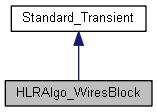A WiresBlock is a set of Blocks. It is used by the DataStructure to structure the Edges. More...
#include <HLRAlgo_WiresBlock.hxx>
Inheritance diagram for HLRAlgo_WiresBlock:

Public Member Functions | |
| HLRAlgo_WiresBlock (const Standard_Integer NbWires) | |
| Create a Block of Blocks. More... | |
| Standard_Integer | NbWires () const |
| void | Set (const Standard_Integer I, const Handle< HLRAlgo_EdgesBlock > &W) |
| Handle< HLRAlgo_EdgesBlock > & | Wire (const Standard_Integer I) |
| void | UpdateMinMax (const HLRAlgo_EdgesBlock::MinMaxIndices &theMinMaxes) |
| HLRAlgo_EdgesBlock::MinMaxIndices & | MinMax () |
 Public Member Functions inherited from Standard_Transient Public Member Functions inherited from Standard_Transient | |
| Standard_Transient () | |
| Empty constructor. More... | |
| Standard_Transient (const Standard_Transient &) | |
| Copy constructor – does nothing. More... | |
| Standard_Transient & | operator= (const Standard_Transient &) |
| Assignment operator, needed to avoid copying reference counter. More... | |
| virtual | ~Standard_Transient () |
| Destructor must be virtual. More... | |
| virtual void | Delete () const |
| Memory deallocator for transient classes. More... | |
| virtual const opencascade::handle< Standard_Type > & | DynamicType () const |
| Returns a type descriptor about this object. More... | |
| Standard_Boolean | IsInstance (const opencascade::handle< Standard_Type > &theType) const |
| Returns a true value if this is an instance of Type. More... | |
| Standard_Boolean | IsInstance (const Standard_CString theTypeName) const |
| Returns a true value if this is an instance of TypeName. More... | |
| Standard_Boolean | IsKind (const opencascade::handle< Standard_Type > &theType) const |
| Returns true if this is an instance of Type or an instance of any class that inherits from Type. Note that multiple inheritance is not supported by OCCT RTTI mechanism. More... | |
| Standard_Boolean | IsKind (const Standard_CString theTypeName) const |
| Returns true if this is an instance of TypeName or an instance of any class that inherits from TypeName. Note that multiple inheritance is not supported by OCCT RTTI mechanism. More... | |
| Standard_Transient * | This () const |
| Returns non-const pointer to this object (like const_cast). For protection against creating handle to objects allocated in stack or call from constructor, it will raise exception Standard_ProgramError if reference counter is zero. More... | |
| Standard_Integer | GetRefCount () const |
| Get the reference counter of this object. More... | |
| void | IncrementRefCounter () const |
| Increments the reference counter of this object. More... | |
| Standard_Integer | DecrementRefCounter () const |
| Decrements the reference counter of this object; returns the decremented value. More... | |
Additional Inherited Members | |
 Public Types inherited from Standard_Transient Public Types inherited from Standard_Transient | |
| typedef void | base_type |
| Returns a type descriptor about this object. More... | |
 Static Public Member Functions inherited from Standard_Transient Static Public Member Functions inherited from Standard_Transient | |
| static const char * | get_type_name () |
| Returns a type descriptor about this object. More... | |
| static const opencascade::handle< Standard_Type > & | get_type_descriptor () |
| Returns type descriptor of Standard_Transient class. More... | |
Detailed Description
A WiresBlock is a set of Blocks. It is used by the DataStructure to structure the Edges.
A WiresBlock contains :
- An Array of Blocks.
Constructor & Destructor Documentation
◆ HLRAlgo_WiresBlock()
|
inline |
Create a Block of Blocks.
Member Function Documentation
◆ MinMax()
|
inline |
◆ NbWires()
|
inline |
◆ Set()
|
inline |
◆ UpdateMinMax()
|
inline |
◆ Wire()
|
inline |
The documentation for this class was generated from the following file:
 1.8.13
1.8.13